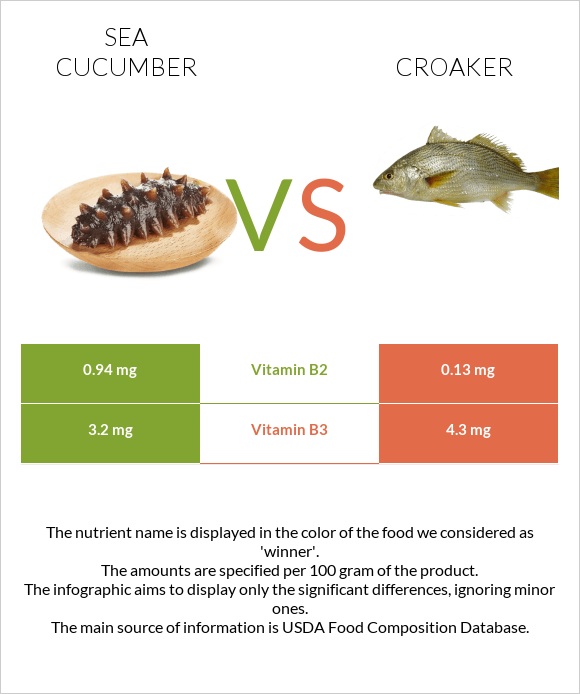Sea cucumber vs. Croaker — In-Depth Nutrition Comparison
Compare
Differences between sea cucumber and croaker
- Sea cucumber is higher in vitamin B2; however, croaker is richer in vitamin B3.
- Sea cucumber's daily need coverage for vitamin B2 is 62% higher.
The food types used in this comparison are Sea cucumber, yane (Alaska Native) and Fish, croaker, Atlantic, cooked, breaded, and fried.
Infographic

Infographic link
Mineral Comparison
Mineral comparison score is based on the number of minerals by which one or the other food is richer. The "coverage" charts below show how much of the daily needs can be covered by 300 grams of the food.
| Contains less SodiumSodium | -100% |
| Contains more IronIron | +43.3% |
Vitamin Comparison
Vitamin comparison score is based on the number of vitamins by which one or the other food is richer. The "coverage" charts below show how much of the daily needs can be covered by 300 grams of the food.
| Contains more Vitamin B2Vitamin B2 | +623.1% |
| Contains more Vitamin B1Vitamin B1 | +80% |
| Contains more Vitamin B3Vitamin B3 | +34.4% |
All nutrients comparison - raw data values
| Nutrient |  |
 |
DV% diff. |
| Vitamin B12 | 2.1µg | 88% | |
| Selenium | 38.8µg | 71% | |
| Vitamin B2 | 0.94mg | 0.13mg | 62% |
| Phosphorus | 217mg | 31% | |
| Cholesterol | 84mg | 28% | |
| Vitamin B6 | 0.26mg | 20% | |
| Fats | 0.4g | 12.67g | 19% |
| Polyunsaturated fat | 2.917g | 19% | |
| Saturated fat | 3.476g | 16% | |
| Sodium | 348mg | 15% | |
| Vitamin B5 | 0.74mg | 15% | |
| Monounsaturated fat | 5.32g | 13% | |
| Protein | 13g | 18.2g | 10% |
| Magnesium | 42mg | 10% | |
| Potassium | 340mg | 10% | |
| Folate | 34µg | 9% | |
| Calories | 56kcal | 221kcal | 8% |
| Copper | 0.065mg | 7% | |
| Vitamin B3 | 3.2mg | 4.3mg | 7% |
| Zinc | 0.52mg | 5% | |
| Carbs | 0g | 7.54g | 3% |
| Iron | 0.6mg | 0.86mg | 3% |
| Vitamin A | 23µg | 3% | |
| Manganese | 0.08mg | 3% | |
| Vitamin B1 | 0.05mg | 0.09mg | 3% |
| Fiber | 0.4g | 2% | |
| Net carbs | 0g | 7.14g | N/A |
| Calcium | 30mg | 32mg | 0% |
| Tryptophan | 0.208mg | 0% | |
| Threonine | 0.788mg | 0% | |
| Isoleucine | 0.847mg | 0% | |
| Leucine | 1.48mg | 0% | |
| Lysine | 1.571mg | 0% | |
| Methionine | 0.525mg | 0% | |
| Phenylalanine | 0.742mg | 0% | |
| Valine | 0.947mg | 0% | |
| Histidine | 0.525mg | 0% | |
| Omega-3 - EPA | 0.113g | N/A | |
| Omega-3 - DHA | 0.089g | N/A | |
| Omega-3 - DPA | 0.079g | N/A |
Macronutrient Comparison
Macronutrient breakdown side-by-side comparison
Protein:
13 g
Fats:
0.4 g
Carbs:
0 g
Water:
80.7 g
Other:
5.9 g
Protein:
18.2 g
Fats:
12.67 g
Carbs:
7.54 g
Water:
59.76 g
Other:
1.83 g
| Contains more WaterWater | +35% |
| Contains more OtherOther | +222.4% |
| Contains more ProteinProtein | +40% |
| Contains more FatsFats | +3067.5% |
| Contains more CarbsCarbs | +∞% |





